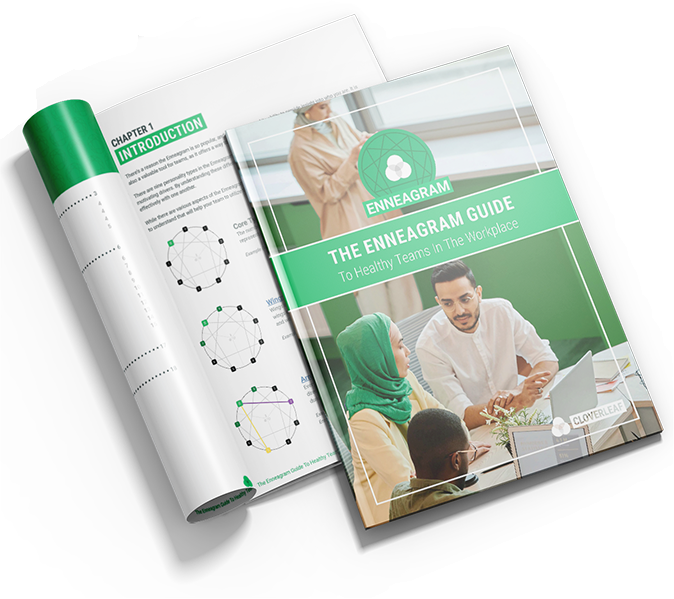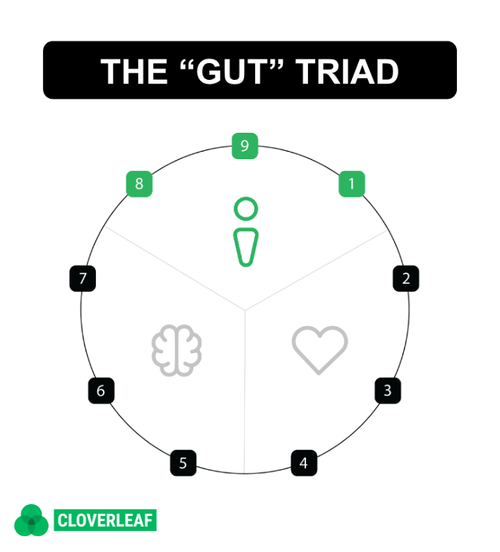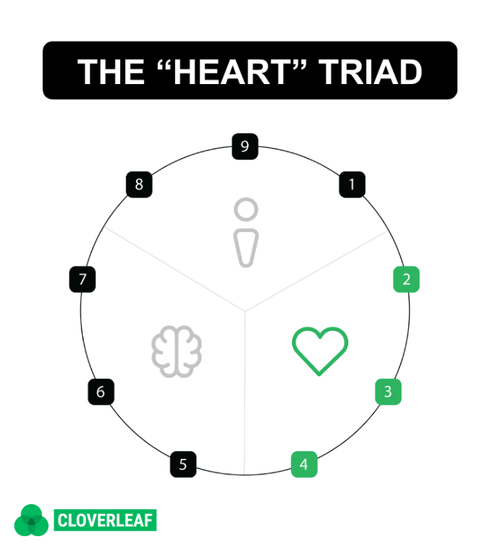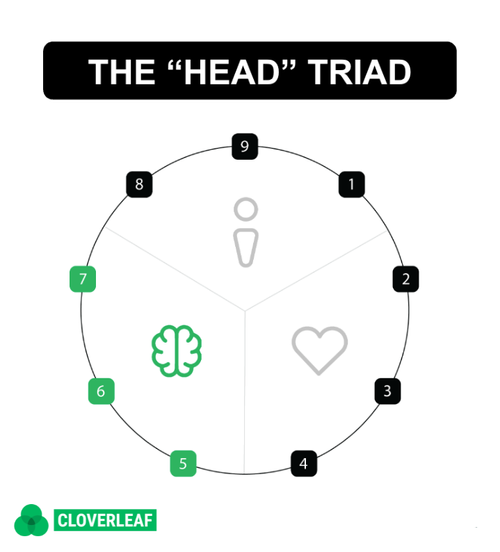Enneagram Triads make up three different sections of the Enneagram model. The groups consist of The Gut: 8-9-1, The Heart: 2-3-4, and The Head: 5-6-7.
Triads split the Enneagram types into three sections based on their underlying emotion and go to decision-making style, specifically in times of stress.
What Are The Enneagram Triads
The three triads are the Gut Triad (Instinctive Center, Heart Triad (Feeling Center), and Head Triad (Thinking Center).
Understanding the triads helps expose patterns of emotion and decision-making, which can result in greater self-awareness and workplace collaboration.
Each type seeks to validate themself in different ways. And, each number in the triad experiences their underlying emotion differently, impacting their decisions and how others perceive them.
Each type can relate to all three triads, and part of the theory behind the Enneagram is that all nine types dwell within us. However, one is our natural “go to,” and that is where our preference – or, ‘type’ – is born.
How Do You Know What Your Enneagram Triad Is?
Enneagram Types 8, 9, and 1’s belong to the Gut Triad. Enneagram Types 2, 3, and 4’s belong to the Heart Triad. And Enneagram Types 5, 6, and 7’s belong to the Head Triad. Your Enneagram Type determines which Triad you are a part of.
If you are already familiar with each triad and are ready to explore how to use the triads to improve communication within your organization, visit the post: How To Activate Emotional Intelligence In The Workplace. Or, download the free Enneagram Guide To Healthy Teams In The Workplace.
Each of the three triads represents a different center of intelligence:
- Gut Triad (8-9-1) → Instinctive decision-makers, driven by anger.
- Heart Triad (2-3-4) → Emotionally driven decision-makers, influenced by shame.
- Head Triad (5-6-7) → Analytical decision-makers, motivated by fear.
Understanding your Enneagram Triad helps uncover why you react to stress the way you do, how you process emotions, and what drives your decision-making. This awareness allows for deeper personal growth, stronger relationships, and improved leadership skills—especially in high-pressure environments.
What Makes the Enneagram Triads Unique?
Most personality models focus on behavioral traits, but the Enneagram Triads go deeper, mapping directly to how our brain processes experiences:
- Gut Triad → Brain Stem (Instincts & Survival)
- Heart Triad → Limbic System (Emotions & Social Connection)
- Head Triad → Neocortex (Logic & Higher-Order Thinking)
By understanding which part of the brain dominates your decision-making, you can improve self-regulation, strengthen communication, and create healthier team dynamics. Whether you’re leading a team, navigating relationships, or working on personal growth, recognizing your triad helps you leverage your strengths while balancing potential blind spots.
In the sections ahead, we’ll dive into each triad, exploring how they process emotions, make decisions, and operate in professional settings—giving you actionable insights to apply in everyday life.

The Enneagram Guide To Healthy Teams
The Gut Triad (Types 8, 9, & 1): Instinctive Decision Makers

People in the Gut Triad experience and process the world primarily through their instincts. They react physically to situations before engaging emotions or logic, relying on a deep inner knowing to navigate decisions.
⚡️ Gut Triad (8-9-1) → Brain Stem (Survival & Instinct)
- This triad operates from instinctual intelligence, making quick, gut-driven decisions.
- The brain stem controls fight, flight, or freeze responses, which is why Types 8, 9, and 1 react strongly to boundaries, autonomy, and justice.
- Their go-to emotion is anger, but each type expresses it differently: 8s externalize, 9s suppress, and 1s internalize.
Core Emotion: Anger (Processed Instinctually)
The Gut Triad’s dominant emotion is anger, but each type expresses, represses, or internalizes it in unique ways:
Enneagram 8s externalize anger → Express it outwardly as control, assertiveness, and leadership. They confront challenges head-on and rarely suppress emotions.
- When Eights feel anger building in them, they immediately respond to it in some physical way, raising their voices and moving more forcefully. Others can clearly see that Eights are angry because they give themselves permission to express their anger physically.
Enneagram 9s repress anger → Avoid conflict by seeking harmony and detachment, often unaware of their own frustration until it builds up.
- Nines deny their anger and instinctual energies as if to say, “What anger? I am not a person who gets angry.” Nines are the type most out of touch with their anger and instinctual energies, often feeling threatened by them.
Enneagram 1s internalize anger → Channel it into self-discipline, perfectionism, and high standards, often feeling a deep sense of personal responsibility.
- Ones feel they must stay in control of themselves at all times, especially of instinctual impulses and angry feelings.
How the Brain Stem Drives Instinctive Reactions In The Gut Triad
The brain stem, responsible for fight, flight or freeze responses, dominates decision-making in this triad. This means:
- They act before analyzing—trusting gut instincts over logic or emotion.
- They have a strong sense of personal agency—knowing instinctively what feels “right” or “wrong.”
- Their physical presence often conveys strength, confidence, or resistance to external control.
Workplace Application: Strengths & Challenges
Strengths:
✅ Quick, decisive leaders who trust their intuition.
✅ Grounded, resilient team members who stand firm under pressure.
✅ High personal integrity—willing to challenge inefficiency or injustice.
Challenges:
⚠️ Can act impulsively—trusting gut feelings without fully considering alternative perspectives.
⚠️ Struggle with collaboration—8s may dominate, 9s may disengage, 1s may critique instead of delegate.
⚠️ Need balance between instinct & strategy—checking impulses before acting ensures stronger, more sustainable decisions.
Understanding how anger fuels their decision-making helps Gut Triad types channel their instinctive strengths while avoiding reactive choices that could create tension in relationships or leadership roles.
Despite their differences, they all experience anger and use their instincts to decide how to act.
The Heart Triad (Types 2, 3, & 4): Emotionally-Driven Decision Makers

The Heart Triad processes the world through feelings and relationships. Their decision-making is deeply emotional, influenced by their connection to others and their sense of self-worth.
💓 Heart Triad (2-3-4) → Limbic System (Emotions & Social Connection)
- This triad is emotionally driven and highly attuned to relationships, social status, and personal identity.
- The limbic system processes emotions, which is why Types 2, 3, and 4 rely on feelings to navigate social interactions.
- Their go-to emotion is shame, influencing their self-worth, public image, and interpersonal relationships.
Core Emotion: Shame (Processed Relationally)
Shame is the underlying emotion that shapes how Heart Triad types see themselves and navigate relationships. Each type expresses, represses, or internalizes shame in a unique way:
Enneagram 2s externalize shame → Seek validation through helping others, believing their worth comes from being needed.
- Twos want to convince themselves that they are good, loving people by focusing on their positive feelings for others while repressing their negative feelings (such as anger and resentment at not being appreciated enough). They attempt to control shame by getting people to like them and think of them as good people.
Enneagram 3s repress shame → Channel it into success and achievement, trying to “outrun” feelings of inadequacy.
- Threes are potentially the most out of touch with underlying feelings of inadequacy. Threes learn to cope with shame by trying to become what they believe a valuable, successful person is like. Thus, Threes learn to perform well, to be acceptable, even outstanding and are often driven relentlessly in their pursuit of success to stave off feelings of shame and fear of failure.
Enneagram 4s internalize shame → Focus on uniqueness and depth, believing they must be different to be valuable.
- Fours attempt to control their shame by focusing on how unique and special their particular talents, feelings, and personal characteristics are. Fours highlight their individuality and creativity as a way of dealing with their shameful feelings, although Fours are the type most likely to succumb to feelings of inadequacy.
How the Limbic System Fuels Emotional Processing
The limbic system, responsible for emotions, bonding, and social connection, dominates decision-making in this triad. This means:
- They read emotions quickly, making them highly intuitive about people.
- Their sense of self-worth is externally influenced, making feedback and recognition crucial.
- They often prioritize relationships over objectivity, which can lead to emotional decision-making.
Workplace Application: Strengths & Challenges
Strengths:
✅ Empathetic leaders who build strong team cultures.
✅ Skilled communicators—understanding unspoken emotional dynamics.
✅ Relationship-focused problem solvers—balancing team needs with productivity.
Challenges:
⚠️ Can over-personalize decisions, allowing emotions to override logic.
⚠️ Struggle with boundaries—2s overextend, 3s overwork, 4s withdraw under stress.
⚠️ Need to integrate emotional intelligence with practical strategy to ensure balanced decision-making.
By recognizing how shame shapes their behavior, Heart Triad types can channel their emotional intelligence into healthy leadership, effective teamwork, and personal growth—without letting emotions dictate every decision.
Despite their differences, they all experience shame and use their feelings to decide how to act.
The Head Triad (Types 5, 6, & 7): Analytical Decision-Makers

The Head Triad processes the world through logic, analysis, and planning. Their relationship with fear and uncertainty shapes their decision-making—each type finds a different way to cope with the unknown.
🧠 Head Triad (5-6-7) → Neocortex (Logic & Higher-Order Thinking)
- This triad processes the world through analysis, problem-solving, and anticipation.
- The neocortex is responsible for rational thinking, which explains why Types 5, 6, and 7 over-rely on logic, strategy, and planning.
- Their go-to emotion is fear, making them focus on security, preparation, and avoiding uncertainty.
Core Emotion: Fear (Processed Cognitively)
Fear is the underlying emotion that shapes how Head Triad types engage with the world, process decisions, and seek security. Each type expresses, represses, or internalizes fear differently:
Enneagram 5s internalize fear → Withdraw from the world and seek knowledge to feel safe and prepared.
- Fives fear the outer world and their capacity to cope with it. Thus, they cope with their fear by withdrawing from the world. Fives become secretive, isolated loners who use their minds to penetrate the nature of the world. Fives hope that eventually, as they understand reality on their own terms, they will be able to rejoin the world and participate in it, but they never feel they know enough to participate with total confidence.
Enneagram 6s externalize fear → Look for external structures, systems, and authorities to create a sense of security.
- Sixes exhibit the most fear of all three of the Head Triad types. This is largely experienced as anxiety, which causes them to be the most out of touch with their own sense of inner knowing and confidence. Sixes have trouble trusting their minds, so they constantly look outside themselves for something to make them feel sure of themselves. They might turn to philosophies, beliefs, relationships, jobs, savings, authorities, or any combination above.
Enneagram 7s repress fear → Distract themselves with new experiences, possibilities, and excitement to avoid discomfort.
- Sevens fear their inner world. Their feelings of pain, loss, deprivation, and general anxiety that Sevens would like to stay clear of as much as possible. To cope with these feelings, Sevens keep their minds occupied with exciting possibilities and options – as long as they have something stimulating to anticipate, Sevens feel that they can distract themselves from their fears.
How the Neocortex Drives Rational Thinking
The neocortex, responsible for logic, problem-solving, and higher-order thinking, dominates decision-making in this triad. This means:
- They process reality through analysis and strategy, ensuring they make well-informed decisions.
- Their fear of uncertainty makes them thorough researchers, but it can also lead to overthinking or avoidance.
- They may disconnect from emotions, preferring intellectualization over vulnerability.
Workplace Application: Strengths & Challenges
Strengths:
✅ Strategic problem-solvers—anticipate risks and think several steps ahead.
✅ Logical and objective—able to detach emotions and assess situations rationally.
✅ Adaptable thinkers—constantly seeking new ideas, solutions, and frameworks.
Challenges:
⚠️ Can overthink and delay action—analysis paralysis can prevent forward momentum.
⚠️ Struggle with emotional connection—tend to intellectualize rather than engage emotionally.
⚠️ May avoid discomfort—5s isolate, 6s seek external validation, and 7s distract themselves with excitement.
By recognizing how fear influences their thinking, Head Triad types can channel their intelligence into decisive action, improve emotional connection, and develop a balanced approach to risk and uncertainty.
Despite their differences, they all experience fear and use their thoughts to decide how to act.
How to Apply Your Triads Insight for Personal Growth & Leadership Development
Understanding your Enneagram triad isn’t just about self-awareness—it’s about using these insights to make better decisions, strengthen relationships, and lead with confidence. By recognizing how your core emotion influences your behavior, you can break unhelpful patterns and develop a more balanced approach to work and life.
Self-Assessment: Do You Express, Repress, or Internalize Your Core Emotion?
Start by reflecting on your natural response to stress, conflict, and decision-making:
- Gut Types (8-9-1): Do you react instinctively in the moment, ignore your feelings, or turn frustration inward?
- Heart Types (2-3-4): Do you seek external validation, overcompensate with achievement, or dwell on emotions?
- Head Types (5-6-7): Do you withdraw and analyze, look for external reassurance, or avoid fear through distractions?
Once you identify your pattern, you can start reframing challenges into growth opportunities.
Growth Strategies for Each Triad
⚡️ Gut Triad (8-9-1): Cultivate Self-Awareness
- Learn to pause before reacting, rather than making snap decisions based on instinct.
- Channel anger into constructive action rather than letting it control you.
- Develop patience and adaptability, allowing for input from others.
💓 Heart Triad (2-3-4): Build Emotional Resilience
- Separate self-worth from external validation—your value isn’t dependent on how others see you.
- Recognize when emotions cloud judgment, ensuring decisions align with long-term goals.
- Cultivate authentic confidence rather than overcompensating through achievement or uniqueness.
🧠 Head Triad (5-6-7): Strengthen Emotional Intelligence
- Balance rational analysis with emotional awareness—not every decision requires exhaustive research.
- Learn to trust your instincts rather than waiting for absolute certainty.
- Practice staying present rather than distracting yourself from discomfort.
How To Use Your Triad to Improve Leadership & Communication
Your core emotion and decision-making style influence how you lead, collaborate, and resolve conflict.
- Gut Types: Focus on balancing decisiveness with adaptability. Strong instincts make you a natural leader, but pausing to listen before acting creates more effective teams.
- Heart Types: Lean into emotional intelligence without over-personalizing feedback. Your relational strength is powerful, but ensuring boundaries will prevent burnout.
- Head Types: Learn to trust your knowledge and intuition without overanalyzing. Your strategic thinking is valuable, but clear, timely decisions create momentum.
Why Understanding Your Triad Matters
Enneagram Triads help reveal the deeper patterns behind our decisions, stress responses, and leadership styles. When you understand your triad, you gain a new level of self-awareness that helps you navigate relationships, career growth, and personal development with more confidence.
Rather than reacting on instinct, emotion, or over-analysis, you can pause, recognize your default tendencies, and make intentional choices that align with who you want to be. This is the key to stronger relationships, better leadership, and more effective communication.
Understanding your triad is just the first step—applying it makes all the difference.
📍 Ready to dive deeper into the Enneagram?
👉 Take the Free Enneagram Test to discover your type & triad and start using this insight to your advantage.
👉 Want to improve team collaboration? Download the Enneagram Guide to Healthy Teams to learn how different triads communicate, make decisions, and handle conflict in the workplace






